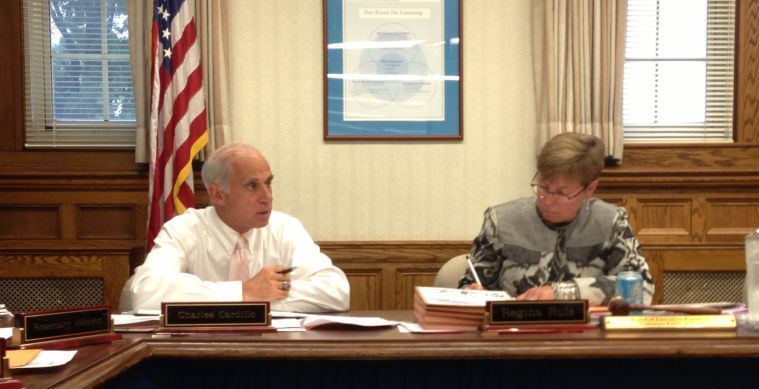Faced with the cuts in extracurricular activities contained in the $86 million Manhasset School District budget approved in June, residents addressed concerns about the quality of education students will receive amid tighter budgets in the next few years at the school board’s meeting on Thursday.
Resident Lisa Zornberg said her family was distressed to learn that the district cut its elementary jazz band and choir programs because her daughter, Aiden Horowitz, 12, had a positive experience in learning two instruments and is passionate about continuing her music education as she moves on to middle school.
“It’s not just another extracurricular activity,” Zornberg said. “It’s something where unbelievable music teachers for years and years have refined it and shined it to the point that it’s a jewel, and kids starting in third grade are excited to get their instruments and learn it in fourth grade and what they perform in fourth grade is remarkable and it prepares them to try out for jazz bands to perform at the SCA fair, and anyone who’s been to one of those music concerts and to see the remarkable accomplishments across an entire school in music just cannot help to be astounded.”
Zornberg said her daughter wants to dedicate her bat mitzvah project to raising money to reinstate the jazz band and choir at Munsey Park Elementary School and Shelter Rock Elementary School. She said she had entered into discussions with Anthony Ambrogio, the district’s administrator for arts and human resources, about how much she’d have to raise.
Zornberg said she was told Aiden would have to raise $5,000 to restore the programs for the spring semester and $10,000 to bring back the programs for the entire year, but the board of education would have to first approve the project in order to receive outside funding.
Chris Allen, the mother of young Manhasset athletes, said she would like to see the district’s modified athletic program return so that all students would be able to participate in their sport of choice.
Allen added that a group of parents held a baseball fundraiser in May that raised “tens of thousands of dollars,” and wanted to open conversations with the district about how to utilize the volunteer work of like-minded Manhasset parents.
“I want to figure out what can we do, what needs to be raised, and how can we harness the volunteers to get this going,” Allen said.
Superintendent of Schools Charles Cardillo said the board would discuss the reinstatement of programs in the near future, but said continuing to work within the tax cap would put a strain on its ability to permanently bring back programs because each year puts Manhasset in a different financial situation.
In addition, the board would have to consider the views of the greater Manhasset community in making such decisions, and Cardillo said he realizes the board cannot bring back every program simply because some residents want to see them return.
In the case of athletics, Cardillo said the board would have a tougher time reinstating the combo teams because the district had to notify Section VIII, Nassau Boces’ governing body for athletics, of its decision to include those programs in the spring, when schedules for the fall season were being made.
Cardillo said he was a big proponent of the combo teams and allowing all students to play, but a major downside to the program’s popularity throughout Nassau is that it presents a lack of competition for schools without combo programs who select their players through a try-out process.
Board of Education President Regina Rule thanked Zornberg and Allen for addressing their concerns and said the district needs “to make a laser-like focus on everything we do well and shift the conversation to remembering what’s really good about this district and what we need to hold on to.”
Residents Marirose Merola and Maureen Lavin announced they met with state Assemblywoman Michelle Schimel (D-Great Neck) on Thursday to discuss a possible amendment to the wording of the state’s tax cap legislation so that districts would not be penalized in years in which they choose to rid themselves of debt instead of increases in spending.
In adopting its 2013-14 budget, Manhasset had an allowable tax levy limit – a figure calculated by the state – of .15 percent because it went through a process of refinancing its debt starting in 2008 when interest rates were low, which increased its budget roughly 2 percent each year.
During that time, the district used $8.5 million in reserve funds to offset tax levy increases while choosing not to increase spending within the district.
But board members have said the tax levy calculations seek to hurt, rather than help districts who don’t spend toward building their school communities.
Merola said Schimel agreed to propose legislation to modify the tax cap laws, but wasn’t positive in its ability to pass because “the 2 percent cap is the governor’s baby and he’s going to continue riding it out to his re-election.”



